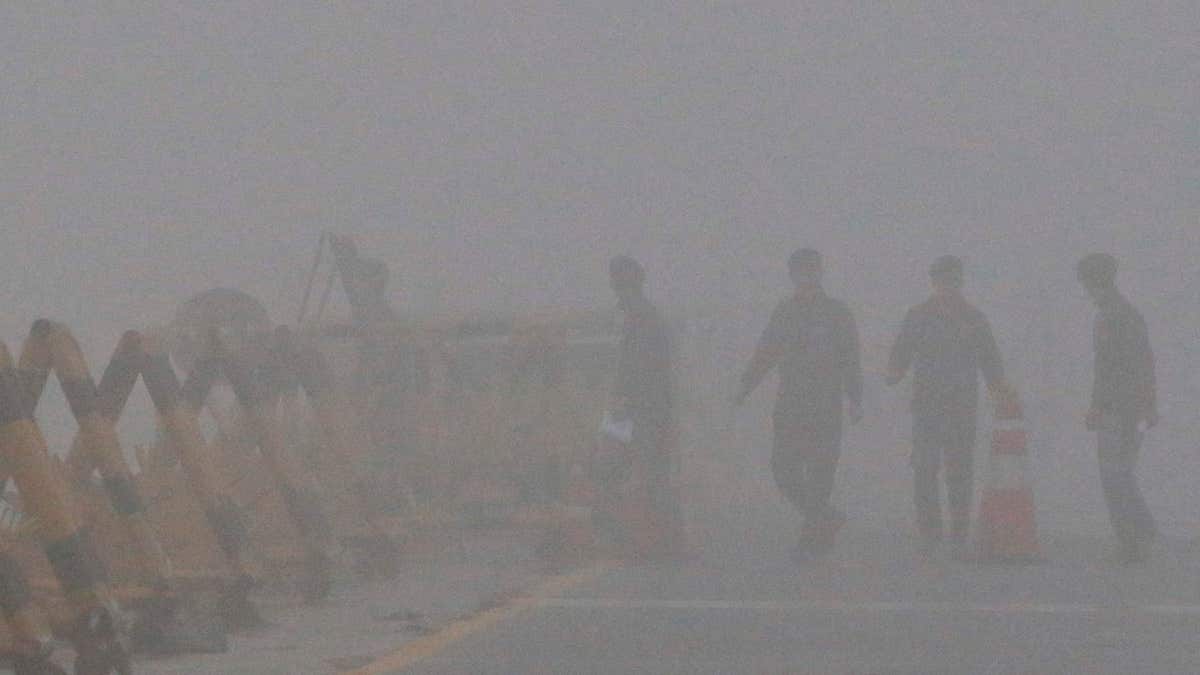
Feb. 12, 2016: South Korean Army soldiers walk on a foggy and rainy morning at Unification Bridge near the border village of Panmunjom in Paju, South Korea. (AP)
The U.S. temporarily deployed an additional Patriot missile battery in South Korea late Friday in response to North Korea’s nuclear test and a long-range rocket launch, ahead of talks next week to set up an even more sophisticated missile defense system.
There was no immediate word from the Pentagon on the deployment of the Terminal High-Altitude Area Defense, or THAAD, missile system, something that China and Russia wouldn’t view favorably.
The extra Patriot missile battery deployment follows South Korea’s decision to shut down a shared factory park that had been the rival Koreas’ last major symbol of cooperation, but that Seoul said had been used by North Korea to fund its nuclear and missile programs. North Korea responded to the closure by deporting South Korean citizens, seizing South Korean assets and vowing to militarize the park.
The U.S. military command in South Korea said Saturday that an air defense battery from Ft. Bliss, Texas has been conducting ballistic missile training using the Patriot system at Osan Air Base near Seoul. Lt. Gen. Thomas Vandal, commander of the U.S. Eighth Army, said "exercises like this ensure we are always ready to defend against an attack from North Korea."
"North Korea's continued development of ballistic missiles against the expressed will of the international community requires the alliance to maintain effective and ready ballistic missile defenses," he said in a statement.
South Korean media have long speculated that the two countries are working on a THAAD deployment in South Korea, but it took the North's rocket launch last Sunday, which outsiders see as a test of banned ballistic missile technology, for the allies to formally announce they will begin the missile defense talks.
Beijing and Moscow are sensitive to the possibility of THAAD in South Korea; critics say the system could help U.S. radar spot missiles in other countries.
China's state media quickly made the country's displeasure known, while Russia also expressed worries about the deployment. North Korea has previously warned of a nuclear war in the region and threatened to bolster its armed forces if the THAAD deployment occurs.
In Munich, U.S. Secretary of State John Kerry met with his Chinese and South Korean counterparts to discuss the response to North Korea's actions, including the missile system. In talks with South Korean Foreign Minister Yun Byung-se, Kerry expressed support for Seoul's decision to shut down the factory park in the North Korean border town of Kaesong and discussed a broad range of potential sanctions against the North, South Korea's Foreign Ministry said.
Seoul and Washington want to deploy the system at an early date and the upcoming talks will discuss where and exactly when the deployment can be made, a South Korean defense official said, requesting anonymity because of department rules.
Fox News’ Lucas Tomlinson and the Associated Press contributed to this report.
